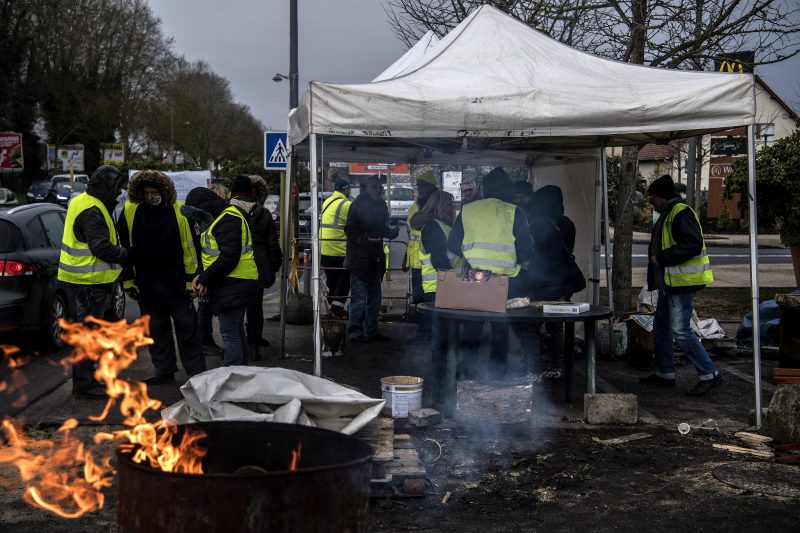French yellow vest anger ‘won’t go back into the bottle’
Protestors wearing ‘yellow vests’ (‘gilets jaunes’) stand at a makeshift shelter at an occupied round-about in Montargis some 130 kms south of Paris (Christophe ARCHAMBAULT)
Montargis (France) (AFP) – An hour south of Paris in the town of Montargis, “yellow vest” demonstrators like Isa Duchesne have no intention of stopping their 12-week protest against President Emmanuel Macron or being drawn into his “great national debate.”
At a roundabout in the south of the town, where violent protests have taken place since November, the 57-year-old factory worker dismissed the government’s two-month debate which has seen dozens of town hall meetings held since the middle of January.
“Macron is preparing for the European elections,” she said bitterly. “He couldn’t care less about us.”
It’s a charge made by many of Macron’s opponents who see the debate as a tactic to distract attention from the “yellow vest” movement which has roiled the country and caused the biggest crisis of Macron’s 20-month presidency.
Announced in December, the national debate has so far provided both an outlet for angry voters to air their grievances — and a stage on which Macron can perform ahead of the EU parliament elections in May.
After months of plummeting approval ratings, the 40-year-old head of state has clawed back some lost ground in recent weeks thanks to a series of public appearances that have sought to stress his more humble side.
The number of “yellow vests” has also fallen sharply nationwide, with fewer and fewer roundabouts occupied, while the mass demonstrations held every Saturday have dwindled in scale.
Most observers agree that the crisis is likely to be a turning point in Macron’s presidency, having highlighted the extent of anger among low-income families in rural and small-town France.
“The anger won’t go back into the bottle,” Marc Pochon, a 64-year-old retiree in Montargis, predicted. “There are so many people today who are suffering. They don’t want any more talking.
Pochon demonstrated for five straight weeks in Montargis “with the elderly, single mothers, retired folk, people who have knocked on every door but can’t make it work”.
But he believes the demonstrations should now come to a halt.
“We’ve got a chance to discuss now, let’s seize it,” he added. “But I say to the president ‘respond now to the plight of the working poor. Don’t wait for the end of the debate’.”
– Into the wall? –
Montargis, known for its 130 bridges across its numerous canals and the Loing river, is like many small towns in France that have been hit by factory closures and rising unemployment — 13 percent at the last count, roughly four percentage points higher than the national average.
“The ‘yellow vest’ movement is still strong here, supported by a large part of the population,” said the head of the Montargis urban area, Franck Supplisson.
The first of four debates in the town, a former production centre for the leather industry, took place last Thursday.
Around 45 people gathered in a public hall in a working-class area of the town where many of the familiar complaints from the “yellow vest” protesters were raised.
They include Macron’s tax cuts for high-earners, shortages of doctors in rural areas, public transport cutbacks and the difficulty of finding stable full-time jobs, forcing many people to take several short-term jobs at the same time to make ends meet.
The microphone was passed from hand to hand, with each person given their chance to speak.
Marie-Reine Poulin, who works in a school canteen, brought up falling living standards for low-income workers — the spark that ignited the protests back in November when a planned rise in fuel prices threatened to hit their spending power.
She appeared unimpressed by tax cuts on overtime and a rise in the minimum wage which were announced by Macron in December, and echoed the feeling found among many protesters that the political and economic system was stacked against them.
“I don’t think it’ll change much. Those who have the power don’t want to lose it,” she said. “But we women need to be there, on the roundabouts, because we are the ones that are most vulnerable.”
Jeremy Clement, a 41-year-old with a construction business, said he had travelled to Paris six weekends in a row to join the protests.
“We live in a rich country. How can we accept that people cannot live off their work?” he told the room. “In the big cities, people don’t realise. But if we don’t change, we’re headed for disaster.”
Disclaimer: This story is published from a syndicated feed. Siliconeer does not assume any liability for the above story. Validity of the above story is for 7 Days from original date of publishing. Content copyright AFP.


